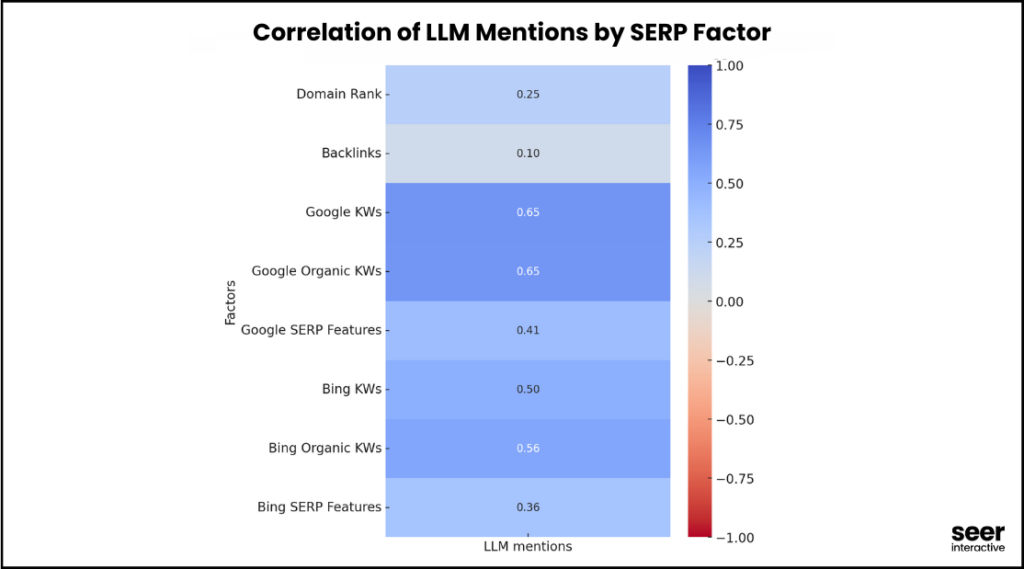Backlinks have long been one of the most prized assets in the SEO world – the holy grail of domain authority and playing a big role in rankings. Link building was the a key lever to pull when you wanted to climb Google’s search results pages.
But AI search and the world of generative engine optimisation has changed things. ChatGPT, Perplexity, Claude, and Google AI Overviews don’t display rankings. They synthesise responses. They don’t just look at keywords and backlinks – they assess information quality, structure, and context.
So where does that leave backlinks in this new world of Generative Engine Optimisation (GEO) and optimising visibility inside LLMs?
Let’s unpack it.
Backlinks as a trust signal: still relevant, but not decisive
Backlinks are still part of the ecosystem. LLMs like GPT-4 and Claude have been trained on data scraped from the web – and therefore backlinks help shape how that content gets discovered and understood.
Citations still matter too. Tools like Google AI Overviews and Perplexity often reference URLs. High-authority domains tend to appear more frequently in those citations. And yes – strong backlink profiles are still a proxy for trust.
But that trust alone doesn’t guarantee inclusion in AI answers.
You could have a page with thousands of backlinks and still not be cited in a single generative response. Because it’s not just about popularity – it’s about usefulness, and AI models have an ability to align content with user intent more effectively and with less reliance on backlinks as a signal.
You might also like: What’s the difference between SEO & GEO?
The data: backlinks aren’t strongly correlated with AI visibility
A recent study by Seer Interactive looked at which brands are being cited most frequently in AI-generated answers – and what factors contributed to that visibility.
Their finding? There’s little to no correlation between backlink volume and brand mentions in AI answers.

In fact, some brands with modest backlink profiles were regularly referenced. Why? Because they appeared in trusted third-party content – review sites, Reddit threads, comparison pages, and practical how to guides.
These are the sources LLMs like to pull from. Not just “official” pages or blog posts with a high domain rating, but helpful content with context.
In the GEO world, not all links are equal
Let’s be clear: not all backlinks matter anymore.
What matters now for B2B software brands:
- Natural citations in trusted sources (G2, Gartner, community blogs)
- Brand mentions in third party roundups or comparison content from credible sources
- Mentions in user generated content (Reddit)
- Inclusion in technical documentation or analyst content
GEO is about earning inclusion – it’s about citation authority, not chasing a Domain Authority score. And sometimes that can be done without needing to worry too much about backlinks.
What matters more than backlinks for GEO?
To earn influence in AI-generated answers, focus on:
- Content clarity – direct answers, scannable formats, structured layouts
- Semantic richness – fully addressing the user intent behind likely prompts
- Source credibility – getting referenced by sources LLMs already trust
- Contextual mentions – being part of wider industry discussions, reviews, and thought leadership
- Entity strength – ensuring your brand and product names are well-associated with key concepts across the web
So… do backlinks still matter?
Yes – but not in the way most SEO agencies still think.
They’re a trust amplifier, not a visibility driver.
They can support your overall domain credibility, but they won’t guarantee inclusion in AI answers. That comes from strategic deep audience intelligence, prompt alignment and content structure.
In the GEO world, backlinks are a piece of the puzzle – not the whole picture.
What we do differently at FirstMotion
At FirstMotion, we don’t chase backlinks. We chase buyer influence.
We use our proprietary ContextualJourney™ platform to map buyer prompts using lots of AI and data enrichment, all built exclusively around B2B software buyer journeys. And we use tools like Peec AI to understand where AI tools are sourcing their answers, and help our clients earn visibility at every stage of the B2B buyer journey.